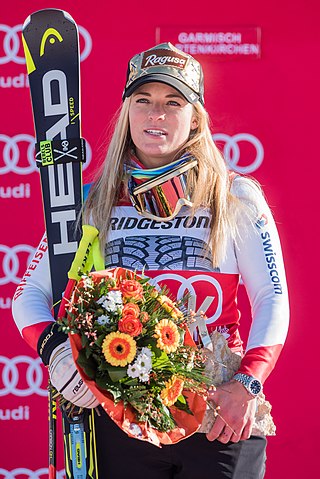
The International Ski Federation (FIS) Alpine Ski World Cup was the premier circuit for alpine skiing competition. The inaugural season launched in January 1967, and the 2018–19 season marks the 53rd consecutive year for the FIS World Cup.

The International Ski Federation (FIS) Alpine Ski World Cup, the premier circuit for alpine skiing competition, began in January 1967, and the 2019–20 season marked the 54th consecutive year for the FIS World Cup. As it had every year since 2006, the season began in Sölden, Austria in October. The season was supposed to end with the World Cup finals in March, which were to be held in Cortina d'Ampezzo, Italy for the first time since they began in 1993, but the finals were cancelled due to the COVID-19 outbreak in Italy.

The women's super-G in the 2021 FIS Alpine Skiing World Cup consisted of 6 events, with one cancellation from the scheduled seven. Swiss skier Lara Gut-Behrami won four of the first five Super-Gs to establish an 195-point lead over Swiss teammate and defending discipline champion Corinne Suter with only two races to go, and she clinched the discipline title for 2021 after the sixth event, which turned out to be the last one for the season.

The women's giant slalom in the 2021 FIS Alpine Skiing World Cup consisted of 8 events including the final in Lenzerheide, Switzerland. The original schedule had included nine events, but a race in Semmering had to be cancelled after the first run had already been completed when hurricane-force winds moved in and caused significant damage, including to the timing equipment.

The men's downhill in the 2021 FIS Alpine Skiing World Cup consisted of seven events. The original schedule had contained nine downhills, but a rescheduled one on 5 March in Saalbach-Hinterglemm, Austria, was canceled due to fog and continual snowfall after just nine skiers had finished, and the downhill during World Cup finals week was also canceled.

The men's super-G in the 2021 FIS Alpine Skiing World Cup consisted of six events, although seven had been originally scheduled.

The men's giant slalom in the 2021 FIS Alpine Skiing World Cup involved ten events, as scheduled.

The men's parallel competition in the 2021 FIS Alpine Skiing World Cup involved only 1 event, a parallel giant slalom, due to the COVID-19 pandemic. Three additional parallel events, scheduled for Alta Badia, Davos, and Chamonix, were cancelled prior to the start of the season.

The men's downhill in the 2020 FIS Alpine Skiing World Cup consisted of nine events, with only one cancellation from the scheduled ten.

The men's super-G in the 2020 FIS Alpine Skiing World Cup involved six events, as the last two scheduled Super-Gs were canceled.

The men's slalom in the 2020 FIS Alpine Ski World Cup involved only nine events, as the final three scheduled slaloms of the season were cancelled.

The Men's combined in the 2020 FIS Alpine Skiing World Cup involved 3 events, all of which were completed before the season was halted due to the COVID-19 pandemic. A major change was made in the discipline this season due to the recent dominance of slalom specialists in the combined over speed racers. As was previously the case, the first run continued to be the speed discipline. The second run then started in reverse order of finish in the speed run, which allowed the slalom specialists to tackle fresh snow as the first down the hill in the slalom run, while the speed specialists had to face the more challenging rutted snow at the end of the day, as the last skiers of the 30 who qualified for the second run. Instead, the second run was changed to start in the same order as the finish of the speed run, so that the leader after the speed run became the first to race on the fresh slalom course.

The men's overall in the 2020 FIS Alpine Skiing World Cup consisted of 36 events in 6 disciplines: downhill (DH), Super-G (SG), giant slalom (GS), slalom (SL), Alpine combined (AC), and parallel (PAR). The season was originally scheduled to have 44 men's races plus a mixed team event, but a race in Japan plus final the seven men's races and the mixed team event were all cancelled, as discussed below.

The women's giant slalom in the 2020 FIS Alpine Skiing World Cup involved 6 events. The season had been scheduled for nine events, but all of the last three giant slaloms were canceled.

The International Ski Federation (FIS) Alpine Ski World Cup was the premier circuit for alpine skiing competition. The inaugural season launched in January 1967, and the 2021–22 season marked the 56th consecutive year for the FIS World Cup.

The men's slalom in the 2022 FIS Alpine Skiing World Cup consisted of ten events including the final. However, the slalom scheduled in Zagreb on 5 January was first delayed until 6 January due to bad weather and then cancelled in the middle of the first run due to additional bad weather, leading to its removal from the schedule. Eventually, however, it was rescheduled for Flachau on 9 March, restoring the season to 10 events.

The International Ski Federation (FIS) Alpine Ski World Cup was the premier circuit for alpine skiing competition. The inaugural season launched in January 1967, and the 2022–23 season marks the 57th consecutive year for the FIS World Cup.

The men's giant slalom in the 2023 FIS Alpine Skiing World Cup consisted of ten events including the final. Defending discipline champion Marco Odermatt of Switzerland opened over a 100-point lead in the discipline by winning four of the first five races and finishing third in the other, although he then missed a race due to injury. Odermatt clinched the discipline championship by winning both giant slaloms on 11-12 March in Kranjska Gora, Slovenia.

The men's giant slalom competition in the 2016 FIS Alpine Skiing World Cup involved eleven events, including the first-ever parallel giant slalom and the season finals in St. Moritz, Switzerland. The newly introduced Parallel giant slalom event at Alta Badia, Italy was a relatively short Giant slalom course that pitted the men against one another in a modified bracket-reduction format from a field of thirty-two qualifying skiers, eventually whittled down to just four final-round racers in a "large final" and a "small final".

The men's slalom competition in the 2016 FIS Alpine Skiing World Cup involved 11 events, including one parallel slalom. However, the city event was moved from Munich on 1 January to Stockholm on 23 February due to organization issues. The last race of the season was at the World Cup finals in St. Moritz.














